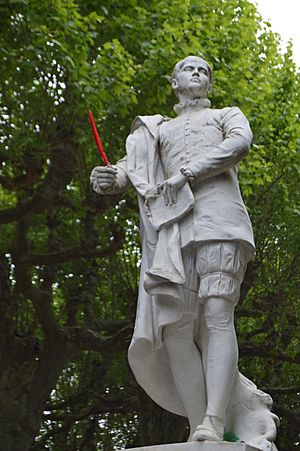Étienne de La Boétie facts for kids
Quick facts for kids
Étienne de La Boétie
|
|
|---|---|
 |
|
| Born | 1 November 1530 Sarlat-la-Canéda, Périgord, France
|
| Died | 18 August 1563 (aged 32) |
| Education |
|
| Era | Renaissance philosophy
|
| Region | Western philosophy
|
| School |
|
|
Main interests
|
Classical studies, legal philosophy, poetry, political philosophy |
|
Notable ideas
|
Voluntary servitude |
|
Influences
|
|
Étienne de La Boétie (born November 1, 1530 – died August 18, 1563) was a French writer, poet, and thinker. He is best known for his close friendship with the famous essayist Michel de Montaigne. La Boétie wrote an important essay called Discourse on Voluntary Servitude. This essay talks about how people sometimes willingly give up their freedom to rulers. It is seen as an early idea behind civil disobedience and standing up against unfair power.
Life of Étienne de La Boétie
Étienne de La Boétie was born in 1530 in Sarlat, a town in southwest France. His family was important and well-known. His father worked for the king in the Périgord region. His mother's brother was the head of the Bordeaux Parliament, which was a high court.
Early Life and Education
Sadly, La Boétie became an orphan when he was young. His uncle, who was a priest, raised him. He studied law at the University of Orléans and finished his degree in 1553.
Career and Achievements
La Boétie was very smart and talented. Because of his skills, he was appointed to the Bordeaux Parliament in 1554. This was special because he was younger than the usual age for this job. He had a successful career as a judge and helped with diplomatic talks.
He was also a gifted poet and scholar. He translated works from ancient Greek writers like Xenophon and Plutarch. He was friends with a group of famous young poets called the Pleiade, including Pierre de Ronsard.
Friendship with Montaigne
La Boétie worked with Michel de Montaigne in the Bordeaux Parliament. Their friendship was very deep and special. Montaigne wrote about their bond in one of his famous essays on friendship.
Views on Religion
La Boétie believed that people of different religions, like Catholics and Protestants, should try to get along. He thought that having two opposing religions in one country could cause problems. He hoped for peace and understanding between them.
Untimely Death
La Boétie died in 1563 at the young age of 32. He passed away from an illness in Germignan, near Bordeaux. Montaigne wrote a long letter describing La Boétie's final days.
La Boétie's Writings
La Boétie wrote several things during his life. These included some poems called sonnets and translations of classic books. But his most famous work is an essay that challenges the idea of absolute monarchy and tyranny.
Discourse on Voluntary Servitude
This essay is called Discours de la servitude volontaire ou le Contr'un. In it, La Boétie argues that rulers, even powerful ones, only have power because people allow them to. He believed that if people stopped obeying a tyrant, the tyrant would lose all power.
He wrote that once a society gives up its freedom, it can become used to being controlled. It might even prefer slavery over the effort of being free. La Boétie connected the idea of obeying someone with the idea of being controlled.
Civil Disobedience
La Boétie suggested a simple solution: people could just refuse to support the tyrant. By doing this, he became one of the first people to talk about civil disobedience. This is the idea of peacefully refusing to follow unfair laws or commands. It's also known as nonviolent resistance.
The historian Murray Rothbard explained La Boétie's main idea like this:
To him, the great mystery of politics was obedience to rulers. Why in the world do people agree to be looted and otherwise oppressed by government overlords? It is not just fear, Boetie explains in the Discourse on Voluntary Servitude, for our consent is required. And that consent can be non-violently withdrawn.
When it was Written
For a long time, people thought La Boétie wrote this essay when he was only 18. However, experts now believe he probably wrote it in 1552 or 1553, when he was 22 years old and studying at the university. The essay was shared privately among friends and was not published until 1576, after La Boétie had died.
Influence of La Boétie
Even though he died young, La Boétie's ideas have influenced many thinkers over the centuries.
Impact on Anarchist Thought
In the 20th century, many European thinkers who believed in anarchism (a political idea that suggests societies can exist without a government) found inspiration in La Boétie's work. People like Gustav Landauer and Simone Weil cited him.
Nonviolent Struggle
Gene Sharp, a leading expert on nonviolent struggle, often mentioned La Boétie's ideas in his books. Sharp's work helps people understand how to create change without violence. La Boétie's concept of "voluntary servitude" is key to understanding how people can resist unfair power by simply withdrawing their consent.
Gallery
See also
 In Spanish: Étienne de La Boétie para niños
In Spanish: Étienne de La Boétie para niños
 | Dorothy Vaughan |
 | Charles Henry Turner |
 | Hildrus Poindexter |
 | Henry Cecil McBay |




